SINGAPORE - Australia's bush fires have become a new target for scammers, with fake fund appeals and bogus charities being used as some of the ploys to solicit money from victims.
This alert was raised by the Australian Federal Police and the Australian Competition Consumer Commission, the Singapore Police Force said in a Facebook post on Tuesday (Jan 14).
In these cases, scammers are known to make cold calls, send out direct messages and create fake websites and pages on social media to solicit funds by pretending to be legitimate well-known charities. The scammers sometimes also create their own charity names and pretend to be people negatively affected by the fires.
Although the Singapore Police Force have not received any locally reported scam cases, the public should remain vigilant, they said.
Meanwhile, in another advisory sent out by the police on Tuesday, the police warned of a few new variants of scams targeting bank customers.
Since January last year, at least 60 reports of these new variants were made and more than $1.6 million was lost by victims.
In the first variant, scammers would call the victims through the Viber messaging app, claiming to be a bank staff member, alleging that the victim's bank accounts had been locked or suspended. They would offer to assist and, in some scenarios, direct victims to a specific WhatsApp number.
Alternatively, victims would receive calls with an automated voice message claiming to be from a bank, informing them that their bank account was locked or would be cancelled. They were then asked to call a number and were transferred to someone claiming to be a bank staff member.
In another variant of the scam, victims would receive an SMS message supposedly from the bank, informing them that their ATM cards were blocked or deactivated. They were then directed to another number to reactivate their cards.
In all these cases, scammers would ask victims for their personal particulars, Internet banking details and one-time passwords.
Unauthorised transactions would then be made from their bank accounts.
The police advised members of the public to beware of unsolicited messages or calls as scammers may use spoofing technology to mask their identities. The public should not disclose their Internet banking details to anyone via phone, e-mail or SMS. Banks or government agencies will never ask for such information through such channels.
The public should also not respond to digital token authentication requests via phone calls if they did not initiate the Internet banking transaction.
Should a person receive a suspicious call claiming to be from his bank, he should also verify the authenticity of the call by dialling the number published on the bank's website.
For scam-related advice, call the anti-scam helpline on 1800-722-6688 or visit www.scamalert.sg
Those who wish to provide information on scams may call the police on 1800-255-0000, or send the information online at www.police.gov.sg/iwitness


